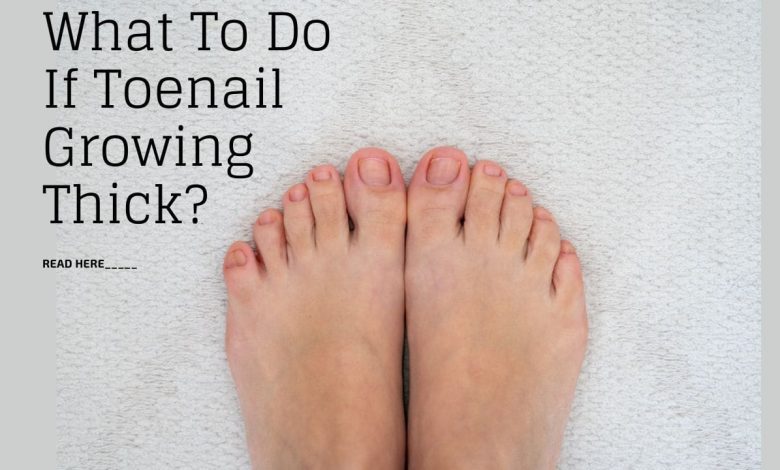What To Do If Toenail Growing Thick?
What To Do If Toenail Growing Thick?

Thick toenails can be a frustrating and uncomfortable problem, making it difficult to wear certain shoes and even causing pain. If you’re dealing with this issue, you may wonder what steps to take to fix it. In this blog post, we’ll discuss the causes of thick toenails and what to do if toenail growing thick. And we’ll offer some tips on how to treat them. We’ll explore various remedies, from home remedies such as soaking your feet in vinegar or tea tree oil, to medical treatments such as prescription medications or nail removal surgery.
Don’t let thick toenails keep you from living your best life. Read on to discover how to get rid of this pesky problem once and for all.
Causes of Thick Toenails
Thick toenails can be a common and frustrating problem for many people. There are several potential causes of thick toenails, including fungal infections, injury or trauma to the nail, and certain medical conditions such as psoriasis or diabetes.
Fungal infections are one of the most common causes of thick toenails, and they can be difficult to treat without proper medical intervention. Injury or trauma to the nail can also cause it to thicken and may require professional treatment in order to heal properly.
If you are experiencing thick toenails, it is important to consult with a healthcare provider who can help determine the underlying cause and recommend appropriate treatment options.
What To Do If Toenail Growing Thick
If you notice that your toenail is growing thick, it may be a sign of an underlying condition or injury. Here are ten things you can do to if your toenail growing thick:
- See a healthcare provider: A healthcare provider can determine the cause of the thickening and recommend the appropriate treatment.
- Keep your feet clean and dry: Keeping your feet clean and dry can help prevent infection and promote healing.
- Wear comfortable shoes: Wearing comfortable shoes with enough space for your toes can help reduce pressure on the affected nail.
- Trim the nail regularly: Regularly trimming the nail can help prevent further thickening and ingrown nails.
- Apply topical treatments: Topical treatments, such as antifungal creams or ointments, may be recommended to treat fungal infections.
- Take oral medications: In some cases, oral medications may be necessary to treat underlying conditions causing the thickening.
- Use home remedies: Home remedies such as soaking the affected foot in warm water with Epsom salt may help relieve symptoms.
- Maintain good foot hygiene: Regularly cleaning and moisturizing your feet can help prevent further complications.
- Avoid trauma to the affected nail: Avoiding trauma to the affected nail, such as stubbing it or dropping something heavy on it, can prevent further damage.
- Be patient: It may take time for the thickened nail to heal or grow out completely, so patience is key when dealing with this issue.
The importance of trimming and filing your nails properly
Properly trimming and filing your nails is essential for maintaining healthy and attractive nails, especially if you have thick nails. Neglecting to trim and file your nails can lead to discomfort, difficulty in performing everyday tasks, and even the development of infections or ingrown nails. You should use an electric nail file for thick toenails.
When trimming your thick nails, it’s important to use proper tools, such as nail clippers or a nail grinder designed for thicker nails. Avoid cutting your nails too short, as this can cause pain and increase the risk of infection. Filing your thick nails regularly can also help prevent them from becoming too long or jagged, which can lead to discomfort when wearing shoes or performing manual tasks. Properly trimmed and filed nails look great and contribute to overall nail health.
How To Prevent Thick Toenails From Developing
Thick toenails can be uncomfortable and unsightly, but there are steps you can take to prevent them from developing in the first place.
- One of the most important things you can do is to practice good foot hygiene. This includes keeping your feet clean and dry, wearing shoes that fit properly, and avoiding walking barefoot in public places.
- You may also want to consider using an antifungal spray or powder on your feet to help prevent fungal infections that can lead to thick toenails.
- Additionally, if you notice any changes in the appearance or texture of your toenails, it’s important to see a healthcare provider as soon as possible. Early treatment can often prevent more serious nail problems from developing down the line.
By taking these simple steps, you can keep your toenails healthy and beautiful for years to come.
Home Remedies For Treating Thick Toenails
Thick toenails can be a frustrating and unsightly problem. Luckily, there are several home remedies that can help treat this common condition.
- One effective remedy is to soak your feet in a solution of warm water and vinegar for 10-15 minutes each day. This can help soften the nails and make them easier to trim.
- Another helpful remedy is to apply tea tree oil directly to the affected nails. Tea tree oil has antifungal properties that can help fight off infections that may be causing the thickening.
- Additionally, keeping your feet clean and dry, wearing breathable shoes and socks, and maintaining good foot hygiene can also help prevent thick toenails from developing in the first place.
While these remedies may not work for everyone, they are a safe and natural option to try before seeking medical treatment.
Tips For Maintaining Healthy Toenails After Treatment
Maintaining healthy toenails after treatment is essential to ensure they remain strong and infection-free. Here are some tips to help keep your toenails healthy post-treatment:
- Keep your feet clean and dry. Moisture can create a breeding ground for fungus and bacteria, so keeping your feet clean and dry is important.
- Trim your nails properly. When trimming your toenails, make sure to cut them straight across to prevent ingrown toenails.
- Wear shoes that fit properly. Shoes that are too tight or too loose can cause discomfort and increase the risk of developing problems with your toenails.
- Moisturize regularly. Applying moisturizer to your feet can help prevent cracking and dryness, which can lead to infections.
- Check for signs of infection. Regularly check your toenails for any signs of discoloration, swelling, or tenderness, as these could indicate an infection.
Following these tips can help maintain healthy toenails after treatment and keep them looking their best.
Conclusion
Having a thick toenail can be uncomfortable and even painful, but there are steps you can take to address the issue. Some at-home remedies include soaking your feet in warm water and applying antifungal creams or tea tree oil. However, if your toenail is severely thickened or causing significant discomfort, it may be necessary to seek professional treatment from a podiatrist. They can provide more advanced treatments like nail removal or laser therapy. Ultimately, addressing the problem early on is important to prevent further complications. If you’re experiencing a thick toenail and need help, don’t hesitate to consult with a healthcare professional for the best course of action.



